How to Increase the Chance of Pregnancy After 35?
Fertility Treatment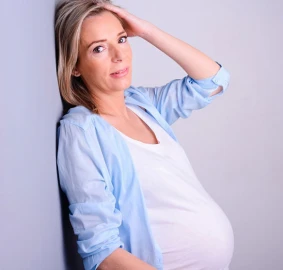
The decision to start a family later in life is becoming increasingly common as women prioritize career goals and personal achievements before embarking on motherhood. However, it's important to understand that fertility decreases with age, particularly after age 35. This decline is due to a decrease in the quantity and quality of eggs and changes in hormonal levels. While conceiving may take longer and require more effort for women in this age group, several proactive measures can be taken to boost fertility and increase the chance of pregnancy by age.
The average time to get pregnant by age can vary, with women in their 20s generally having a higher fertility rate and a quicker conception time frame. It should be said that the odds of pregnancy by age increase reproductive risks in the 30s, such as female infertility or birth defects. It may also lead to complications for mothers and babies. Read on to learn about the factors that can help with a successful pregnancy after 35.

When Is the Best Age to Get Pregnant?
The best age to get pregnant is when the couple is ready. However, since women have different reproductive powers at different stages of their lives, they may face challenges in getting pregnant as they age.
Girls have a certain number of eggs when they are born, known as ovarian reserve. With aging, the follicles containing eggs are destroyed and decreased over time due to menstruation and other natural interactions of the female body.
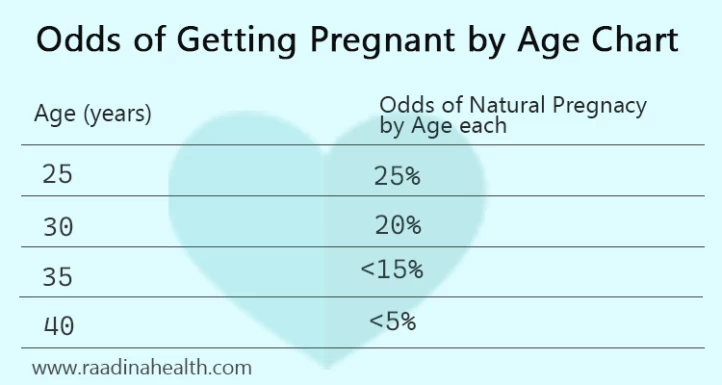
Why Does the Chance of Pregnancy Decrease with Age?
Different factors can cause female infertility, the most important of which is aging. Female aging can lead to the following risk factors:
- Reduced vaginal discharge and thinned endometrium lining;
- Short and irregular menstrual cycle;
- Diminished ovarian reserve;
- Increased risk of chronic diseases and reproductive problems such as polycystic ovary syndrome, chlamydia, and endometriosis.
What Age Is the Advanced Maternal Age?
As said above, it is impossible to determine the threshold of advanced maternal age accurately; however, it is considered 35. Even with the development of assisted reproductive technologies such as egg freezing and embryo freezing through IVF, it is still impossible to be safe from the risks of pregnancy after 35, such as multiple births.
According to research, the pregnancy chances drop by age 40. Although, this does not mean that women over 40 are infertile. However, they are at a higher risk of pregnancy-related complications than women at younger ages.
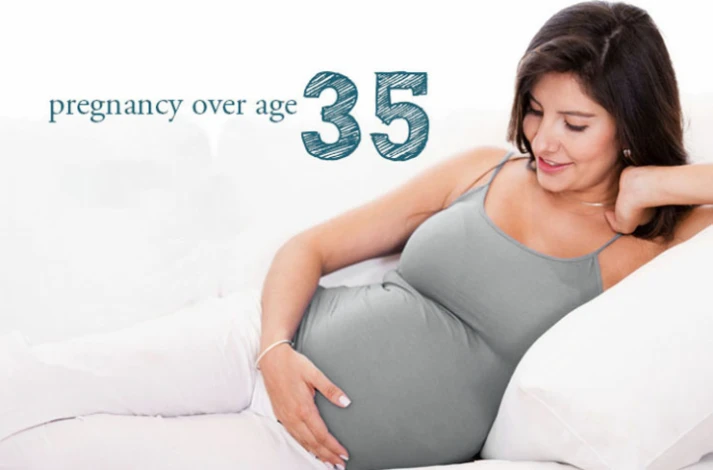
How Much Is Female Fertility in Different Life Stages?
Female ability to get pregnant begins from the first-period cycle until menopause (end of menstruation). The chance of a successful pregnancy is 30% in a monthly cycle in fertile couples under normal conditions. However, pregnancy-related risks vary at all ages and may be associated with a higher risk at certain times.
According to OB-GYNs' advice, the best time for women to get pregnant is the 20th. The reason is that they have enough physical ability to endure the pregnancy in this decade. On the other hand, from age 30, women's ability to have children decreases. Female reproductive ability falls drastically after the age of 35.
The risk of birth defects and miscarriage will also increase after 35. Therefore, it is recommended that over-35-year-old pregnant women be under the supervision of a doctor and perform more tests regarding the health of the mother and the baby.
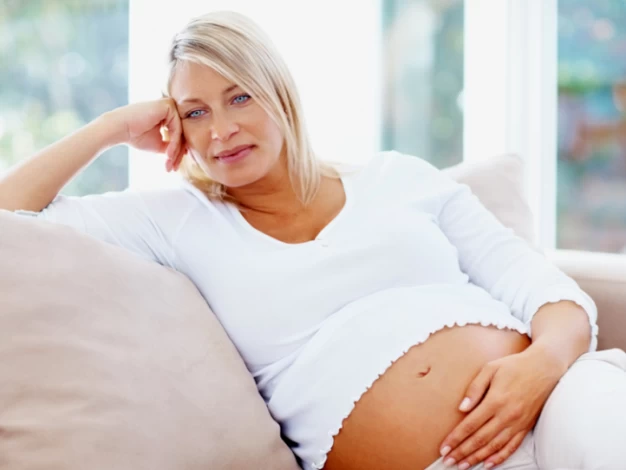
Pregnancy after 35 Stage-by-Stage Guide
Before Pregnancy
Suppose you're considering becoming pregnant, especially if you're over 35. In that case, it's crucial to speak with a healthcare provider to review any possible dangers or issues, given your age. A person's age, medical history, and future objectives all have a significant role. You and your doctor can devise a personalized plan and establish healthy lifestyle practices, such as regular exercise and proper eating, at a pre-pregnancy visit to help you maintain your healthiest when it's time to get pregnant.
A pre-pregnancy visit can be an excellent chance to discuss fertility options with your doctor. Regarding fertility therapies and treatments, there are more possibilities than ever before. Thanks to technological advances, there are more possibilities than ever before for fertility treatments and therapies.
During Pregnancy
Pregnant women over 35 are more likely to experience issues such as gestational diabetes, preeclampsia, cesarean delivery, preterm labor and low birth weight, stillbirth, and fetal chromosomal abnormalities.
Regular prenatal examinations and tests, such as blood tests for gestational diabetes, at-home blood pressure monitoring for preeclampsia, genetic screening tests for diseases like Down syndrome, and diagnostic exams like amniocentesis, can identify these issues.
Mothers need to discuss screening and diagnostic procedures in-depth with their obstetrician and gynecologist, particularly when it comes to chromosomal abnormalities. Pregnant women must know these hazards and take the necessary precautions to protect their health and well-being.
After Childbirth
When it comes to the mother's health, the 12 weeks following childbirth, or the fourth trimester, are equally as crucial as the first three. In the United States, maternal mortality is increasing, especially for women over 40, whose mortality rate is about eight times higher than that of women under 25.
Prioritizing postpartum follow-up doctor visits is crucial to lowering maternal complications and mortality. Within the first three weeks following delivery, the American College of Obstetricians and Gynecologists advises a post-birth evaluation and, by 12 weeks, a thorough examination.
Within the first week or two, high-risk women should visit their doctor. Seek emergency medical assistance if you have symptoms such as fever, chills, shortness of breath, dizziness, or brisk bleeding.
What Are the Risks and Complications of Pregnancy at an Advanced Age?
As with pregnancy at other ages, getting pregnant after 35 requires special care. However, the risks and complications of geriatric pregnancy will be more than those of other ages.
The complications of pregnancy at geriatric pregnancy age on mothers:
- More overweight;
- Fatigue and weakness;
- Stretch marks;
- Saggy breasts;
- Sarcopenia (loss of muscle strength and function);
- Preeclampsia (High blood pressure);
- Cesarean section due to placenta formation and cervical stenosis;
- Occurrence of various types of bleeding, especially during the first trimester of pregnancy, due to placenta previa or placental abruption;
- Increased risk of gestational diabetes;
- Premature birth.
Women's age and pregnancy complications on babies:
- Higher birth weight - more than 4 kg - or fetal macrosomia due to maternal gestational diabetes that can lead to C-section or birth injuries;
- Fetal growth restriction;
- Chromosomal conditions caused by reduced number and quality of eggs and frequent miscarriages;
- Down syndrome.
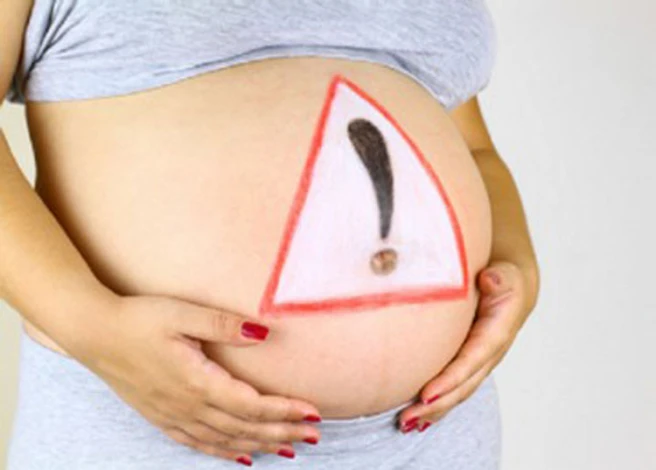
What Are the Complications of Pregnancy at an Advanced Age on Childbirth?
Pregnancy after 35 may cause negative and sometimes serious effects on childbirth, such as stillbirth and forced cesarean section. Although, it does not affect breastfeeding.
A stillbirth occurs when a baby dies after 28 weeks of pregnancy due to the placental dysfunction that prevents the delivery of nutrients and oxygen to the baby. This can make the pressure of childbirth unbearable for the baby and result in fetal death. The forced cesarean section can also happen due to inadequate uterine contractions at an advanced age.
How Can an Advanced Maternal Age Cause Recurrent Miscarriage?
Advanced maternal age can contribute to recurrent miscarriage due to various factors. As women age, the quality and quantity of their eggs decrease, leading to an increased risk of chromosomal abnormalities in embryos, which can result in early pregnancy loss. Additionally, older women are more likely to have underlying health conditions such as diabetes, hypertension, and thyroid disorders, which can impact their ability to carry a pregnancy to term.
The decline in ovarian function and overall reproductive aging can also make it more difficult for older women to conceive and sustain a pregnancy, increasing the likelihood of recurrent miscarriages. Furthermore, advanced maternal age is associated with a higher prevalence of uterine abnormalities and autoimmune disorders, which can also contribute to repeated pregnancy losses.
Chances of pregnancy after 35
The pregnancy chance after age 35 decrease compared to earlier reproductive years. This is because a woman's fertility gradually declines as she gets older. However, it is still possible for women over 35 to conceive and have a healthy pregnancy. The decline in fertility is mainly due to a decrease in the number and quality of eggs in the ovaries. Additionally, there is an increased risk of certain pregnancy complications and genetic abnormalities in babies born to older mothers.
How to Increase the Chances of a Healthy Pregnancy at an Advanced Age?
To increase the chances of a successful and healthy pregnancy at an advanced age, it is recommended that older women take some measures before and even during reproductive technologies, the most important of which are as follows:
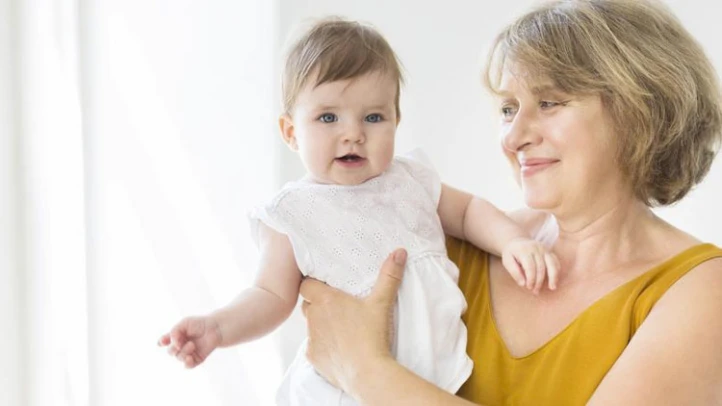
Doing Pre-pregnancy examinations
Performing pre-pregnancy checkups and getting gynecology consultations about pregnancy after turning 35 are some of the most important measures that help women identify any physical problems and disabilities in having children. They also will have an accurate and effective plan for a healthy pregnancy.
Performing regular and timely examinations
Women can improve the chances of a healthy pregnancy and reduce pregnancy-related risks at an advanced age by taking timely examinations and checkups. Performing regular tests, ultrasounds, and physical examinations during the first 8 weeks of pregnancy can lead to early diagnosis and treatment of complications such as gestational diabetes and preeclampsia.
Having a healthy diet
Eating a healthy diet containing vitamin D and iron before and during pregnancy is one of the most effective factors for a successful pregnancy that can make pregnancy easier.
Getting regular physical activity
It is recommended that older mothers do regular physical activities and have a proper exercise program under the supervision of a doctor to strengthen their general health, prevent pain, increase their body energy, and strengthen their muscles.
Taking essential vitamins during pregnancy
It is very important to take adequate amounts of folic acid during the first trimester of pregnancy and even before pregnancy. It will help prevent birth defects in the baby's spinal cord and brain. It should be said that taking folic acid is more important in older mothers due to the increased risk of birth defects in pregnancy at an advanced age.

Maintaining a healthy weight
Maintaining a healthy weight at any age, especially after 35, can reduce pregnancy-related risks and increase the chance of having a healthy baby. This can also help preserve the mother's health.
Avoid smoking and drinking alcohol.
Since consuming alcohol, drugs, and tobacco is forbidden during pregnancy, pregnant women should inform their doctor before taking any medicine or supplement.
Following a healthy lifestyle
A healthy lifestyle, such as getting good-quality and adequate sleep and avoiding heavy activities during pregnancy, can lead to an easy advanced-age pregnancy. Also, controlling blood sugar through dietary modifications, physical activity, or certain medicines is another important factor in a healthy and easy pregnancy.
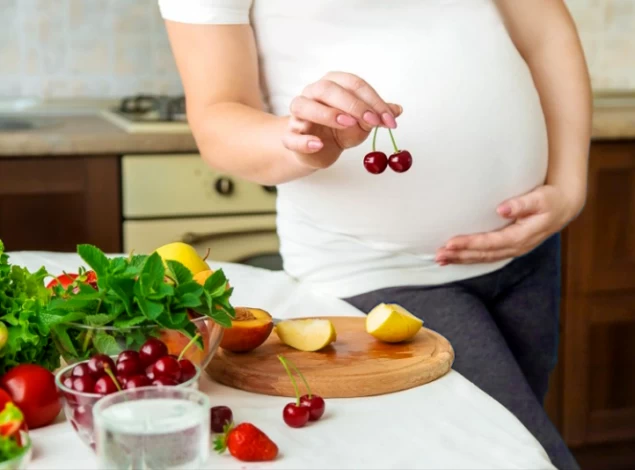
What Infertility Treatments Can Help Pregnancy in an Advanced Age?
Women have two choices when deciding to get pregnant: either to get pregnant naturally at a younger age or use assisted reproductive technologies at an advanced age.
Assisted reproductive technologies can help women to get pregnant until menopause (usually 51 years old). Although, as it was said, the success rate of these technologies is very low in women over 40 years old.
Assisted reproductive technologies (ART) at an advanced age include using fertility drugs as well as some in-vitro techniques as follows:
Egg Freezing
Egg freezing is one of the common methods that help women preserve their eggs at a younger age for future use. This method can be used by women who are unmarried or intend to postpone pregnancy.
During egg freezing, women receive stimulation ovulation drugs to release an egg, and then the released egg is stored. This egg can be thawed at the desired time and transferred to the uterus after being fertilized with sperm.
It should be noted that although egg freezing can help with having healthy eggs, sometimes other problems such as PCOS and uterine disorders may prevent successful pregnancy.

Women's Age and IVF
As women age, their fertility declines due to a decrease in the quantity and quality of their eggs. This can make it more challenging for older women to conceive naturally. In vitro fertilization (IVF) is a common fertility treatment option) that can be used with egg freezing or without it) for women who are struggling to conceive, including those of advanced maternal age.
During IVF treatment, the egg and sperm are fertilized in the laboratory, and the resulting embryo is transferred to the woman's uterus. The IVF method is also very useful in cases where infertility is caused by male-factor and sperm weakness.
IVF with Donor Egg
Although egg donation should be the final solution, it is a good way to get high-quality eggs and try to have children. During egg donation, the donor egg is fertilized with sperm in the laboratory, and the resulting embryo is transferred into the uterus.
Second Pregnancy after 35
Expectant mothers may face particular considerations and experiences if they become pregnant again after turning 35. Although it's typical for women to postpone pregnancy until their mid- or late-thirties, it's crucial to be aware of the possible threats and challenges. However, many women in their late thirties or forties have successful pregnancies and healthy kids with the right prenatal care and monitoring. A healthy lifestyle that includes regular exercise, a balanced diet, and attending all advised prenatal checkups is essential for older expectant mothers. While additional factors may be considered during a second pregnancy after 35, proper care and support can still be a joyful and fulfilling experience for both mother and child.
IVF with Donor Egg in Iran
In cases where the patient suffers from severely diminished ovarian reserve, the fertility specialist suggests IVF with a donor egg. In this method, high-quality eggs are retrieved from another woman's ovaries and are fertilized with the intended father's sperm (or donor sperm) in the laboratory. This procedure requires the expertise of a qualified embryologist and the experience of an adept fertility doctor.
Iran is one of the leading countries in using donor eggs in assisted conception methods because it is home to the best embryologists and fertility specialists in the world, and its hospitals are equipped with the latest surgical devices needed for IVF. Also, the queues for getting donor eggs in Iran are usually short, so you don't have to wait long to get a healthy egg. Therefore, Iran is your best choice if you are over 35 and need a donor egg.
Frequently Asked Questions About Pregnancy at an Advanced Age
1) How to increase the chances of having a healthy pregnancy at an advanced age?
To have a healthy pregnancy at an advanced age, women should do regular medical checkups, follow a healthy diet, get regular exercise, consume a proper dose of folic acid daily, avoid smoking and alcohol, maintain a healthy weight, and prevent overweight or obesity, avoid exposure to harmful substances, etc.
2) Are there higher chances of having twins after 35?
Aging does not increase the chance of having twins or multiples by itself. However, since many women use assisted reproductive techniques such as IVF or fertility drugs for getting pregnant, there is an increased risk of having more than one embryo. It should also be noted that there is usually a higher risk of premature birth in twin or multiple pregnancies.
3) Does the father's age also affect pregnancy?
So far, no research has not proven that the father's aging can cause pregnancy disorders and fetal problems. However, there seems to be a higher risk of babies with Down syndrome in men over 55. Also, a group of researchers recommends that men try for a baby before 40.
4) What do obstetrician-gynaecologists recommend for pregnancy at an advanced age?
In case of pregnancy at an advanced age, the OB/GYNs will perform various examinations and tests to confirm the mother's physical health.
The doctors will tell the couples about the costs of assisted reproductive technologies such as IVF and egg donation and explain the risks of pregnancy after 35 with these methods. Tests such as the AMH test are usually performed to check ovarian reserve.
It should be noted that doctors do not usually recommend a specific time for pregnancy to couples, and this decision depends on the couple's preparation and their plans for the future. However, it is often recommended for women who intend to get pregnant at an advanced age to take necessary measures from the age of 20 onwards (such as medical examinations, ovarian reserve tests, and egg freezing).
5) Does egg quality affect IVF success at an advanced age?
Yes! The quality of a woman's egg plays an effective role in having a successful pregnancy. Aging, on the other hand, will cause diminished ovarian reserve and low egg quality. Therefore, maternal aging can also affect the success of IVF. To experience a successful IVF, a sufficient number of mature and high-quality follicles must be needed in the egg retrieval procedure.
The tests that can check egg quality at an advanced age include antral follicle count (AFC) ultrasound, Müllerian hormone (AMH) test, and follicle-stimulating hormone (FSH) levels test.
In conclusion, low-quality eggs can lead to risks such as miscarriage, difficult pregnancy, and IVF failure. Therefore, preventing these complications with techniques like egg freezing at a young age is important.
6) How common is Down syndrome with advanced maternal age?
According to the Centers for Disease Control and Prevention (CDC), the risk of giving birth to a baby with Down syndrome increases with maternal age. While the likelihood of having a baby with Down syndrome is about 1 in 1,250 for a 25-year-old mother, it increases to about 1 in 86 for a 40-year-old mother.
7) How can age affect labour and delivery?
Older mothers are more likely to experience prolonged labour, need intervention such as forceps or vacuum-assisted delivery, and have a higher chance of requiring a cesarean section. Additionally, women of advanced maternal age have an increased risk of pregnancy-related conditions such as gestational diabetes and hypertension, which can further complicate labour and delivery.


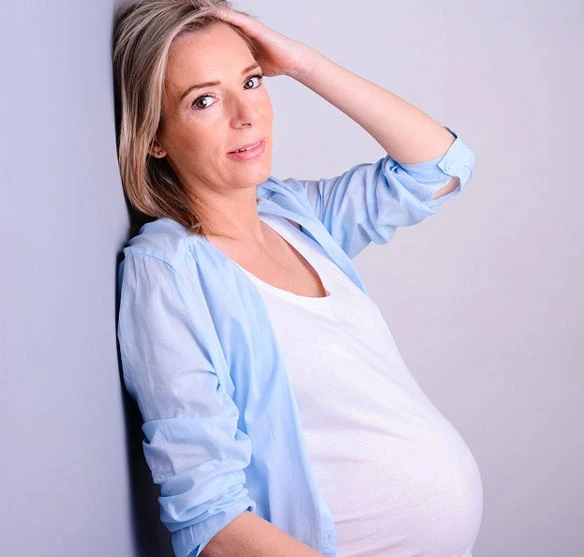
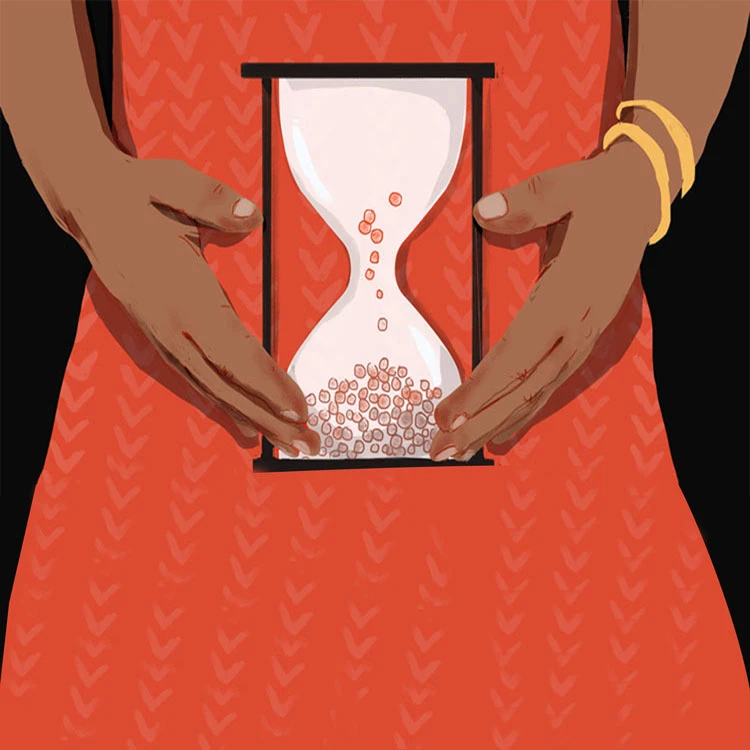
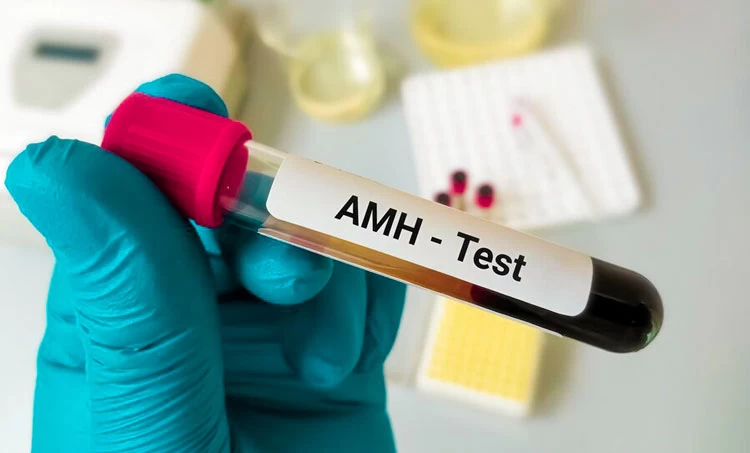
User
-I am now about 38 years old and recently my pregnancy test was positive. Is special care necessary during pregnancy?
Habib Ebrahimi
-Hello,
During pregnancy after 35, women should regularly be under medical care before and after pregnancy and take prenatal care carefully. It is also necessary for them to learn how to measure their blood sugar and blood pressure during this period.
Ultrasounds during pregnancy can detect certain congenital disorders such as Down syndrome that should be performed exactly in the specified weeks.